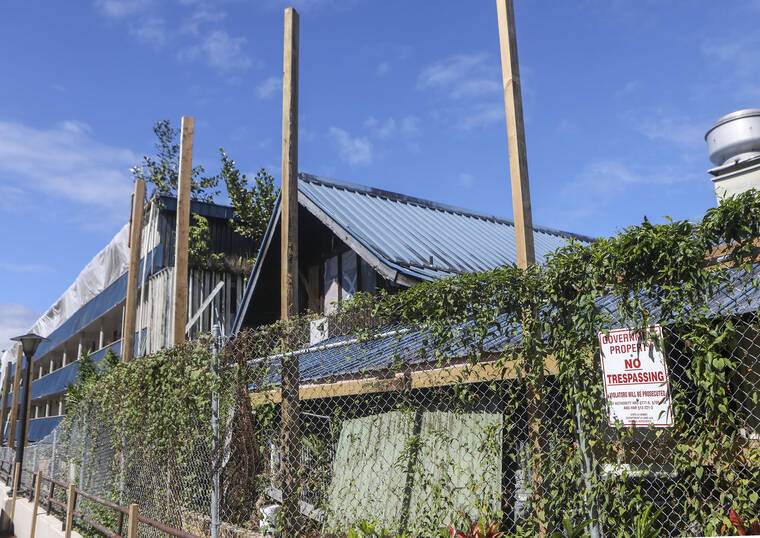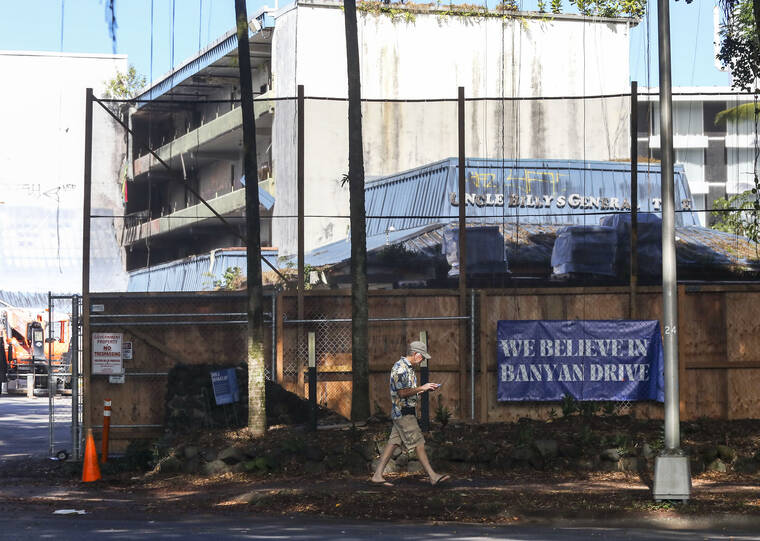The state Department of Land and Natural Resources says it expects to complete the demolition of the former Uncle Billy’s Hilo Bay Hotel by November.
In an Feb. 2 email, DLNR spokesman Dan Dennison said the department’s Engineering Division maintains that work currently being performed by Isemoto Contracting Co. to abate hazardous materials — including asbestos — on the Banyan Drive site isn’t expected to cause a significant delay in the demolition of the former 148-room hotel.
The remediation was described as “a necessary first step” to prevent demolition activities “from spreading the potentially hazardous materials.”
The asbestos will be packaged and trucked to the West Hawaii landfill where it will be disposed of “in accordance with applicable regulations,” Dennison said.
“The volume of demolition waste depends on several factors such as the size that the material is reduced to during demolition and the amount of waste that is practical to recycle,” he said. “Building materials that will not be recycled will be disposed of at the landfill.”
According to the DLNR, an 18-foot-tall dust screen is being built around the 0.53-acre property “to keep demolition dust and debris on the Uncle Billy’s property.”
”The safety and well-being of our neighbors, as well as the public, is of top concern, and measures have been taken to mitigate/reduce impacts to them,” Dennison said. “… Additional dust screen measures will be constructed for the Hilo Hawaiian Hotel due to the narrow setback between the two properties. Erosion control best management practice measures will be installed to prevent runoff to the neighboring properties and Hilo Bay.
“The project team met with the hotels during the design phase of the project to inform them of the situation and to listen to their concerns. The likely concern will be loud demolition noise. As a result, the contractor is not allowed to undertake demolition of buildings, hydraulic hammering and concrete processing (i.e. loud activities) prior to 9 a.m.”
The state Legislature in 2022 appropriated $13.5 million out of the DLNR Special Land and Development Fund for the demolition of the hotel. However, the SLDF does not have $13.5 million to pay for the demolition.
In the 2023 session, the Legislature appropriated $8 million in reimbursable general obligation bond funds that the DLNR will have to pay back over time with interest, according to the department.
Prior to the construction of fences and a wooden wall around the four-story former hotel, the property had become an eyesore, and the building became a haven for homeless and drug use. Squatters had littered the building with rubbish, human waste and graffiti.
Arson, ceiling collapses, hanging wires and trip hazards made the property dangerous for those who entered.
“We realize how long Hawaii Island residents, and especially the Hilo community, have waited for work to begin at Uncle Billy’s,” Dennison said. “We appreciate everyone’s patience, as our primary concern has always been health and safety of everyone.”
Future use of the property remains a question.
“Any such decision would have to be made by the Board of Land and Natural Resources at an open meeting at which the public would have an opportunity to testify,” Dennison said.
At least one public meeting has been conducted by the DLNR about plans for the redevelopment of the Waiakea Peninsula. Other Banyan Drive properties — on land owned by the state and leased to private entities by DLNR — have also fallen into disrepair, including the former Country Club condos, now leased by Banyan Drive Development.
The BLNR last April authorized DLNR’s Land Division to negotiate a $20 million agreement with Banyan Drive Development for a makeover of the former Country Club.
The Orchid Isle Hotel was destroyed by fire in 1986, and the piece of real estate it occupied has remained vacant and undeveloped since.
Email John Burnett at jburnett@hawaiitribune-herald.com.









